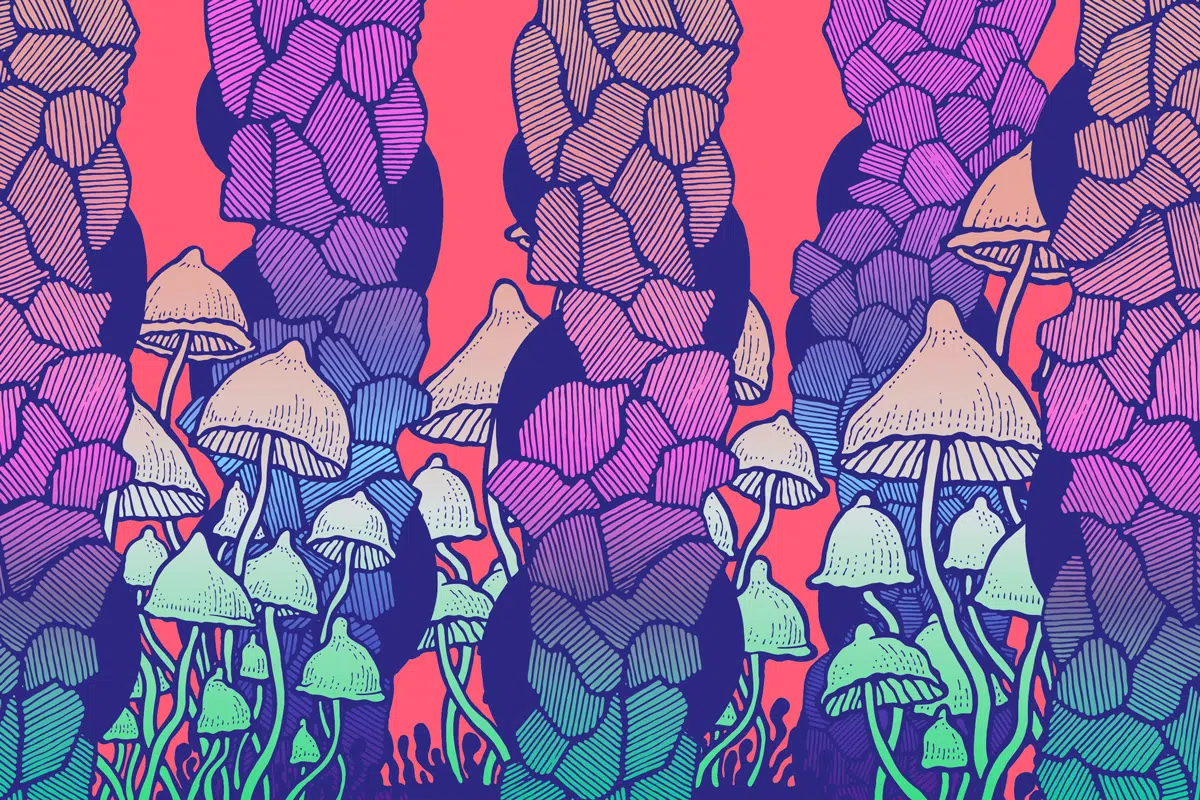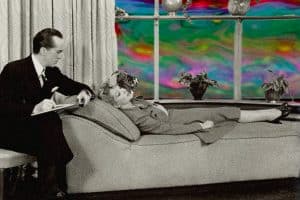On February 8, a team of lawyers will file a 13,000-word merits brief to a judge, outlining their carefully honed arguments for why psilocybin should be removed from Schedule 1—the US Drug Enforcement Administration’s (DEA) most tightly-regulated category. But first they’re hoping to hear from amici curiae (“friends of the court”) who will be able to support their case.
The request for “amicus briefs” (amicus being the singular form of amici) is the latest chapter in what has become a long and thorny legal battle between seven attorneys—representing two cancer patients seeking access to psilocybin for end-of-life distress, their physician, and his clinic—and the DEA, a branch of the Department of Justice (DOJ). At the heart of the dispute is a single question: Should the government be compelled to make psilocybin—which is currently illegal at the federal level—available to terminally ill patients?
The process began two years ago, when attorney Kathryn Tucker, on behalf of Seattle palliative care physician Dr. Sunil Aggarwal of the Advanced Integrative Medical Science (AIMS) Institute, sought permission from the DEA to make psilocybin-assisted therapies available to a group of Aggarwal’s cancer patients who were also suffering from acute anxiety. Tucker submitted a request to the DEA, invoking the Right to Try (RTT) act, a federal law which (in theory) provides patients with life-threatening conditions access to what the Food and Drug Administration’s (FDA) website describes as “investigational treatment options”; that is, drugs and therapies that have shown clinical promise but have yet to be approved by the federal government. (These laws were passed in part to provide a shortcut through the FDA-approval process, which often takes years and costs many millions of dollars.) The FDA granted psilocybin Breakthrough Therapy status for treatment-resistant depression in 2018 and for major depressive disorder in 2019, a designation intended to hasten the federal approval process for drugs that have shown promise for conditions that can’t reliably be treated by FDA-approved drugs or other therapies.
READ: After Permitting Psilocybin for Terminal Patients, Canada Could Open the Door to Psychedelics
The DEA denied the request, forcing Tucker and her colleagues to adjust course and file a petition with the agency to move psilocybin from Schedule 1 to the less-stringent Schedule 2. The DEA shot back with a formal refusal either to grant access to psilocybin via RTT or to reschedule the compound. Undeterred, the attorneys then resolved to open an entirely new case aimed at proving that keeping psilocybin in Schedule 1 is an infringement of federal law. To make their case, they point to the very document that made psychedelics illegal in the first place: the 1970 Controlled Substances Act (CSA).
The CSA describes a Schedule 2 drug as one that “has a currently accepted medical use or a currently accepted medical use with severe restrictions [italics added].” Tucker and her colleagues intend to prove that psilocybin fits that latter description, and therefore belongs in Schedule 2—along with other, demonstrably more toxic drugs like opium, fentanyl, and oxycodone.
“It’s really this simple: If the law says that if something has a currently accepted medical use with severe restrictions, it shouldn’t be in Schedule 1,” says Shane Pennington, an attorney working alongside Tucker. “And now that psilocybin has received Breakthrough [Therapy] designation from the FDA, that is currently accepted medical use with severe restrictions. Period.”
How to Grow Shrooms Bundle
Take Both of Our Courses and Save $90!
READ: Where Is Psychedelic-Assisted Therapy Legal?
According to Pennington, psilocybin’s continued status as a Schedule 1 drug—meaning a drug “with no currently accepted medical use and high potential for abuse”—is not the result of some harmless oversight on the part of the DEA, but rather that of an intricate and intentional process of obfuscation, “a vast, Rube Goldberg-like, Kafkaesque, long, winding road of bullshit.”
“Our position is that what the government is doing here is indefensible,” Pennington says. “Under the law, there has to be a reasonable explanation for what they’re doing. And there simply isn’t. We intend to prove that.”
Tucker and Pennington hope the amici briefs will add a human face to their case; an emotional weight to counterbalance their long and intricate legal arguments. Pennington believes that a judge who reads the firsthand account from someone who has benefited from psilocybin directly, for example, will be more likely to approach the long-demonized subject of psychedelics with an open mind. “I’m not saying that judges assume we represent Bill and Ted’s Excellent Adventure when we walk into court, but they may not realize how many veterans, children with rare diseases, elderly people with terminal illness are watching this case,” he says.
“I’d like to see the veterans come in and share their powerful voices in the context of the lawsuit,” says Tucker. “Not one more veteran should commit suicide who could have had relief from MDMA. Not one more veteran should feel the need to fly to Peru to access this therapy. Not one more. They should come in and say that in this case. We invite their participation.”
In addition to firsthand accounts, the attorneys are encouraging participation from individuals or organizations that can offer a clear and concise explanation of how US drug-scheduling law has evolved to its current point, and that can make the judges’ jobs easier by connecting them with relevant resources. The attorneys also want to emphasize the growing bipartisan support for psychedelic research, and thereby encourage organizations from a diversity of political backgrounds to submit amicus briefs.
READ: Where Are Magic Mushrooms Legal?
Pennington points out that courts tend to abide by what’s known as the “presumption of regularity,” which holds that the executive branch of US government can typically be trusted to carry out its job effectively and in good faith. This means the onus of responsibility will fall on Pennington and his colleagues to prove that the federal government, in this case, has deviated from the letter of the law. Another goal of the amici briefs, therefore, is to educate the judges about psilocybin and US drug-scheduling law to convince the judges that the presumption of regularity should not apply in this case.
The FDA and DEA told DoubleBlind over email that they would be unable to comment for this story, citing confidentiality concerns and ongoing litigation, respectively.

DoubleBlind is a trusted resource for news, evidence-based education, and reporting on psychedelics. We work with leading medical professionals, scientific researchers, journalists, mycologists, indigenous stewards, and cultural pioneers. Read about our editorial policy and fact-checking process here.

DoubleBlind Magazine does not encourage or condone any illegal activities, including but not limited to the use of illegal substances. We do not provide mental health, clinical, or medical services. We are not a substitute for medical, psychological, or psychiatric diagnosis, treatment, or advice. If you are in a crisis or if you or any other person may be in danger or experiencing a mental health emergency, immediately call 911 or your local emergency resources. If you are considering suicide, please call 988 to connect with the National Suicide Prevention Lifeline.



